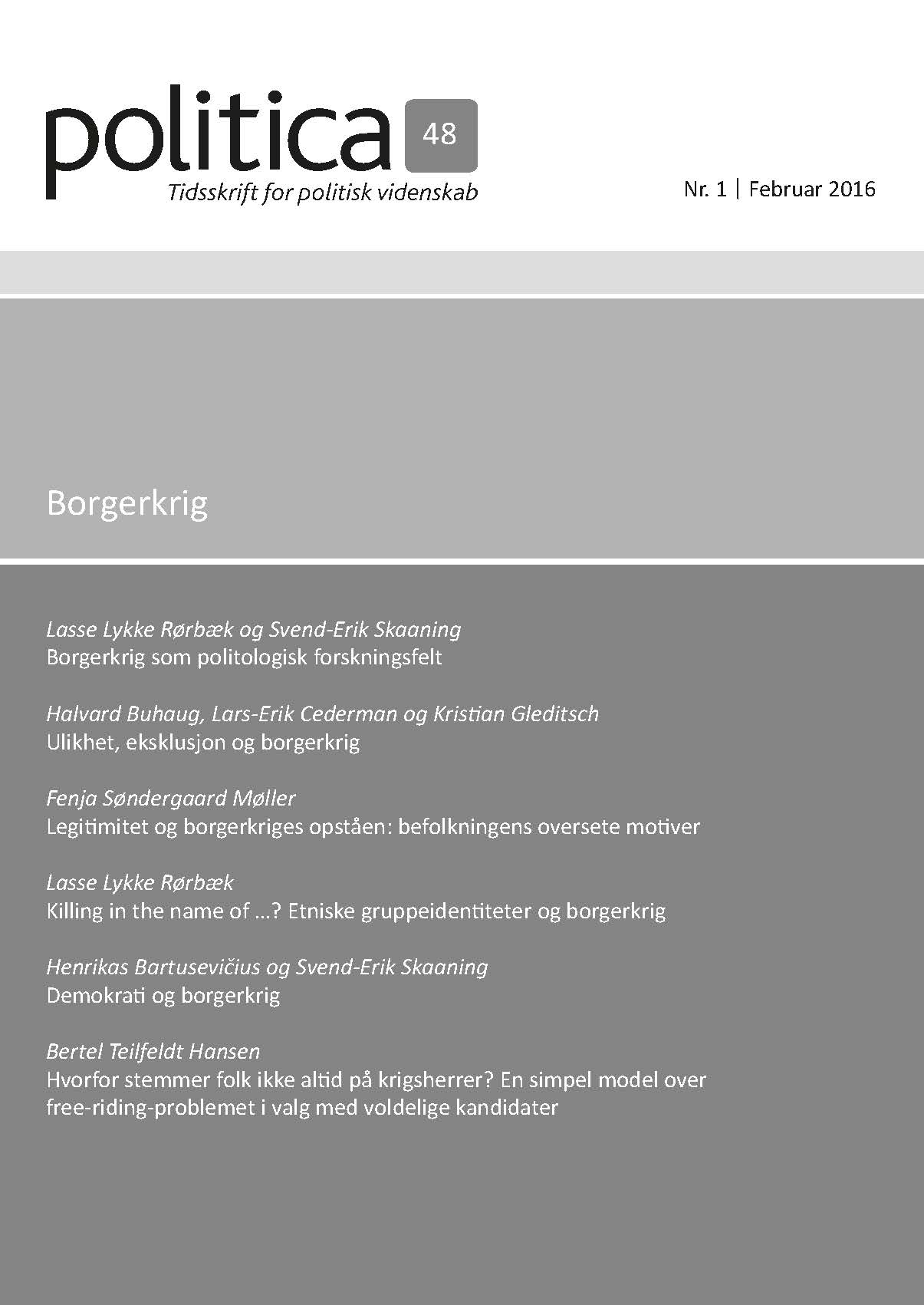Killing in the name of …? Etniske gruppeidentiteter og borgerkrig
DOI:
https://doi.org/10.7146/politica.v48i1.131418Abstract
Denne artikel diskuterer to modstridende forståelser af sammenhængen mellem etniske gruppeidentiteter og borgerkrig. Den første fokuserer på variationen mellem forskellige identitetstyper med den forventning, at religiøse og racemæssige skel er særligt konfliktskabende. Ifølge den anden forståelse har etniske grupper generelt tætte sociale netværk, og deres motiver og muligheder for at kæmpe påvirkes af deres politiske status og ressourcer frem for deres specifikke identitetstyper. Ved hjælp af statistisk analyse viser artiklen, at sandsynligheden for borgerkrigsudbrud ikke påvirkes af, hvorvidt etniske grupper primært er mobiliseret omkring religiøse, sproglige, racemæssige eller regionale skel. Analysen finder således støtte til, at forskellige typer af etniske grupper kan sidestilles når det studeres, hvorfor nogle politiske konflikter udvikler sig voldeligt.
References
Borer, Tristan A. (1996). Church leadership, state repression, and the “spiral of involvement” in South African anti-apartheid movement, 1983-1990, pp. 125-143 i Christian Schmidt (red.), Disruptive Religion: The Force of Faith in Social Movement Activism. New York, NY: Routledge.
Cederman, Lars-Erik, Kristian S. Gleditsch og Halvard Buhaug (2013). Inequality, Grievances, and Civil War. New York, NY: Cambridge University Press.
Cederman, Lars-Erik, Andreas Wimmer og Brian Min (2010). Why do ethnic groups rebel? New data and analysis. World Politics 62 (1): 87-119.
Chandra, Kanchan (2006). What is ethnic identity and does it matter? Annual Review of Political Science 9: 397-424.
Cornell, Stephen og Douglas Hartmann (1998). Ethnicity and Race: Making Identities in a Changing World. Thousands Oaks, CA: SAGE Publications.
Denny, Elaine og Barbara Walter (2014). Ethnicity and civil war. Journal of Peace Research 51 (2): 199-212.
Edwards, Bob og John D. McCarthy (2007). Resources and social movements mobilization, pp. 116-152 i David Snow, Sarah Soule og Hanspeter Kriesi (red.), The Blackwell Companion to Social Movements. New York: John Wiley & Sons.
Fox, Jonathan (2005). Religion, Civilization, and Civil War: 1945 Through the New Millennium. Lanham, MD: Lexington.
Gates, Scott, Håvard Hegre, Mark P. Jones og Håvard Strand (2006). Institutional inconsistency and political instability: polity duration, 1800-2000. American Journal of Political Science 50 (4): 893-908.
Groelsema, Robert (1998). The dialectics of citizenship and ethnicity in Guinea. Africa Today 45 (3-4): 411-422.
Gurr, Ted R. (2000). Peoples Versus States: Minorities at Risk in the New Century. Washington, DC: United States Institute of Peace Press.
Haklai, Oded (2000). A minority rule over a hostile majority: the case of Syria. Nationalism and Ethnic Politics 6 (3): 19-50.
Horowitz, Donald L. (1985). Ethnic Groups in Conflict. Berkely and Los Angeles, CA: University of California Press.
Huntington, Samuel (1996). The Clash of Civilizations and the Remaking of World Order. New York, NY: Simon and Schuster.
Laitin, David (2000). Language conflict and violence: The straw that strengthens the camel’s back. European Journal of Sociology 41 (1): 97-137.
Olzak, Susan (2006). The Global Dynamics of Racial and Ethnic Mobilization. Stanford, CA: Stanford University Press.
Reynal-Querol, Marta (2002). Ethnicity, political systems, and civil wars. Journal of Conflict Resolution 46 (1): 29-54.
Roeder, Philip (2003). Clash of civilizations and escalation of domestic ethnopolitical conflicts. Comparative Political Studies 36: 509-540.
Smith, Christian (1996). Correcting a curious neglect, or bringing religion back in, pp. 1-25 i Christian Smith (red.), Disruptive Religion: The Force of Faith in Social Movement Activism. New York, NY: Routledge.
Wimmer, Andreas (2013). Ethnic Boundary Making: Institutions, Power, Networks. Oxford: Oxford University Press.
Wimmer, Andreas (2015). Race-centrism: a critique of a research agenda. Ethnic and Racial Studies 38 (13): 2186-2205.





